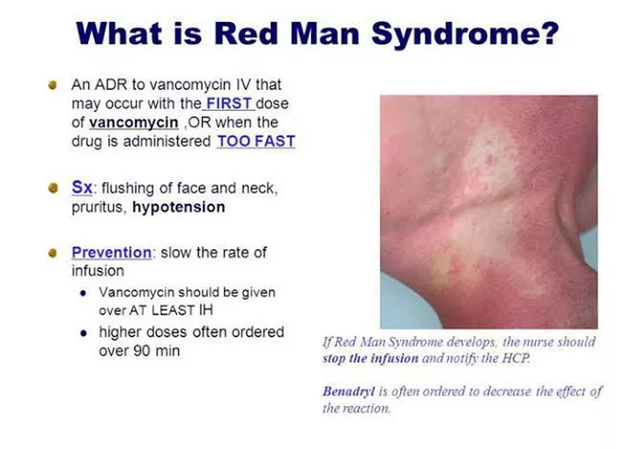The nurse is caring for a patient who is receiving vancomycin (Vancocin). The nurse notes that the patient is experiencing flushing, rash, pruritus, and urticaria. The patient's heart rate is 120 beats per minute, and the blood pressure is 92/57 mm Hg. The nurse understands that these findings are consistent with:
allergic reaction.
rhabdomyolysis.
Stevens-Johnson syndrome.
red man syndrome.
The Correct Answer is D
Allergic reaction: An allergic reaction can manifest in various ways, including rash, itching, and difficulty breathing. However, the specific symptoms described, along with the context of vancomycin administration, point to red man syndrome in this case.
Rhabdomyolysis: Rhabdomyolysis is a condition where damaged muscle tissue breaks down and releases a protein called myoglobin into the bloodstream. This can cause kidney damage, but the symptoms described do not align with rhabdomyolysis.
Stevens-Johnson syndrome: Stevens-Johnson syndrome is a severe skin reaction that can cause skin and mucous membranes to blister, peel, and can be life-threatening. While it can present with rash and other skin symptoms, the symptoms mentioned in the scenario are more characteristic of red man syndrome.
Red man syndrome: As mentioned earlier, red man syndrome is an allergic reaction to vancomycin characterized by flushing, rash, pruritus, and urticaria (hives), along with rapid heart rate and low blood pressure. It is specific to vancomycin and can be prevented or minimized by slowing down the infusion rate and administering antihistamines.

Nursing Test Bank
Naxlex Comprehensive Predictor Exams
Related Questions
Correct Answer is A
Explanation
A. Most type-1 reactions are allergic: This statement is accurate. Type-1 hypersensitivity reactions are typically associated with allergies. When a person is exposed to a specific allergen (like pollen or certain foods), their immune system overreacts, leading to various symptoms, from mild to severe.
B. It is mediated by IgA: This statement is incorrect. Type-1 hypersensitivity reactions are primarily mediated by immunoglobulin E (IgE) antibodies. When these antibodies bind to allergens, they trigger the release of histamine and other chemicals, causing allergic symptoms.
C. It never contributes to autoimmune diseases: This statement is incorrect. While type-1 hypersensitivity reactions are often associated with allergies, they are distinct from autoimmune diseases. In autoimmune diseases, the immune system mistakenly attacks the body's own cells and tissues, which is a different mechanism from hypersensitivity reactions.
D. Most occur against medications: This statement is not entirely accurate. While some type-1 hypersensitivity reactions can be triggered by medications (like penicillin), they can also be caused by various other allergens such as pollen, animal dander, insect venom, and certain foods. The prevalence of medication-induced type-1 reactions varies, and it's not accurate to say that most occur against medications.
Correct Answer is D
Explanation
A. Neutrophils: Neutrophils are a type of white blood cell that plays a key role in the immune system's response to infections, particularly bacterial infections. They are not primarily involved in eliminating cancer cells.
B. Eosinophils: Eosinophils are another type of white blood cell. They are important in the immune response to parasites and are also involved in allergic reactions. While they have a role in the immune system, they are not the primary cells involved in eliminating cancer cells.
C. Platelets: Platelets, also known as thrombocytes, are not cells but rather small cell fragments. They are essential for blood clotting and do not directly participate in the immune response against cancer cells.
D. Macrophages: Macrophages are a type of white blood cell that are involved in the immune system's defense against cancer. They are phagocytes, which means they engulf and digest cellular debris, foreign substances, and cancer cells. Macrophages play a crucial role in the body's immune surveillance and response against cancer.
Whether you are a student looking to ace your exams or a practicing nurse seeking to enhance your expertise , our nursing education contents will empower you with the confidence and competence to make a difference in the lives of patients and become a respected leader in the healthcare field.
Visit Naxlex, invest in your future and unlock endless possibilities with our unparalleled nursing education contents today
Report Wrong Answer on the Current Question
Do you disagree with the answer? If yes, what is your expected answer? Explain.
Kindly be descriptive with the issue you are facing.
